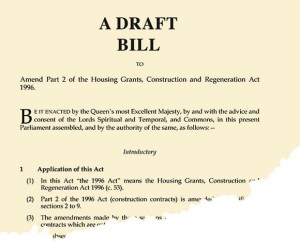Technical
The Construction Contracts Bill
Marion Rich, BCSA Director of Legal and Contractural Affairs, explains what is proposed in the long awaited Construction Contracts Bill. Some parts might simply provoke new disputes, she warns.
 On 21 July 2008, BERR (the department for Business, Enterprise and Regulatory Reform) published the Construction Contracts Bill (the ‘Bill’) together with Explanatory Notes. This is the culmination of over 4 years work reviewing the Construction Act (that is, Part II of the Housing Grants, Construction and Regeneration Act 1996); the review was originally announced by the Chancellor in his March 2004 Budget.
On 21 July 2008, BERR (the department for Business, Enterprise and Regulatory Reform) published the Construction Contracts Bill (the ‘Bill’) together with Explanatory Notes. This is the culmination of over 4 years work reviewing the Construction Act (that is, Part II of the Housing Grants, Construction and Regeneration Act 1996); the review was originally announced by the Chancellor in his March 2004 Budget.
The Bill will apply to England, Wales and Scotland (although this is a devolved matter, Scottish ministers have requested that the legislation include Scotland). Nothing is said about the position in Northern Ireland (the legislation in Northern Ireland is the Construction Contracts (Northern Ireland) Order 1997) but we are told that a consultation has started.
Statutory adjudication, introduced by the Construction Act, has been the success story of the construction industry since the Act came into force a little over 10 years ago. It is now established as the dispute resolution procedure of choice for most people in the industry and overall, the system has proved robust and been well supported by the courts. This has, unfortunately, also had the unwanted side effect of making the process more formal and legalistic. Perhaps this is not surprising as adjudication deals with contractual rights and duties but it is far from what was wanted by the industry when the system began.
The payment provisions of the Act have never worked as expected at the time the Construction Act was passed.
The process over the last 4 years or so has been directed at establishing between the government and the industry what changes need to be made to the Construction Act to improve it and get rid of many of the perceived problems. The process has been thorough to the point of exhaustive and it is to BERR’s credit that it has been prepared to engage with industry to this degree.
So after all the time, the written submissions and the public events, what has BERR come up with?
Adjudication
Requirement for contracts to be in writing. Since the decision in RJT Consulting Engineers in 2002, the position has been that all the provisions of the contract need to be in writing. This has led to a number of difficulties and the industry as a whole has proved keen to get rid of the requirement.
The Bill does this very simply but unfortunately, then goes on with further clauses to the effect that adjudication provisions need to be in writing and has also (largely) reproduced the discredited wording that caused the problems in the first place. This is completely unnecessary and is only likely to provoke new disputes.
Costs. For years, the industry has had to deal with contracts which provide that one party to an adjudication should pay all the costs of the other party, irrespective of the outcome. The Bill outlaws the practice unless agreement is made after the appointment of the adjudicator but unfortunately, then sets up a complex structure regarding referral to court that achieves nothing but sets up disputes for the future.
Slip rule. English case law allows adjudicators to correct slips in an adjudication decision – typos, mistakes in addition etc – after the decision has been published. The position is not so clear in Scotland and the Bill provides that contracts in Scotland must allow corrections to be made.
Payment
Interim Payment Decisions. This clause is designed to prevent interim payment decisions made by a person other than one of the parties from being made binding, unless the parties agree to this after the decision is notified to them. This clause seems to make little sense and it is not clear what mischief it is trying to remedy.
Payment by reference to Other Contracts. This clause provides that tying payment to an obligation under another contract (that is, pay when paid/certified) is not an ‘adequate payment mechanism’ under the (current) legislation.
The Payment System. The rest of the clauses in the Bill re-jig the whole payment system as currently set out in the Construction Act.
In essence, the proposed amendments require
- the contract to specify that either the paying party/certifier (‘payer’) or the person receiving the payment (‘payee’) to give a notice of the amount it considers should be paid and the basis on which the sum is calculated;
- if the contract requires the payer to give the notice and it does not, then the payee can always give a notice (ie, make an application) and that sum becomes due (subject to any withholding);
- if the contract does not specify that either the payer or the payee is to give a notice, then the Scheme for Construction Contracts will apply
The Construction Act has not been successful in ensuring that payees always know what they are entitled to – it does not crystallise a debt. So the changes are in general very good news but as always, the devil really is in the detail.
Where the payer issues a notice, the payee does not have any influence over the amount, his only remedy being to challenge the amount in an adjudication. Adjudication should not be a normal part of the payment system and provision is required to allow challenge within the process. Where the payer has to issue an application in default of the payer doing so, the time for payment can become protracted.
Worse is the amendment preserving the House of Lords decision in Melville Dundas Ltd (in receivership) v Wimpey UK Ltd. This provides that there is no requirement to pay the notified sum where the payee has become insolvent and the contract provides that the payer need not pay any sum due in that case. This is an extraordinary provision – in effect, it allows a party to profit from its own breach of contract, a thing that should not be legitimised in an Act of Parliament.
Finally, the draft bill improves the rights of parties who suspend performance of their contract for non-payment by providing that the suspending party can claim back its reasonable expenses.











